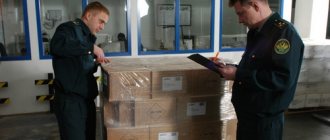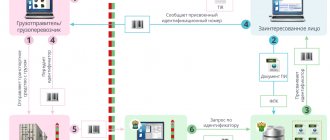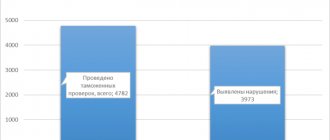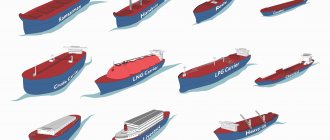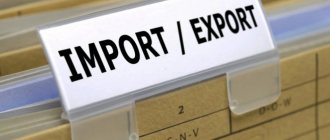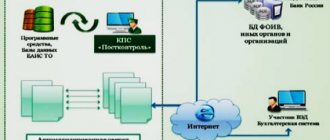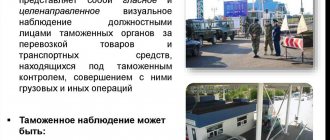Decision to appoint a customs examination
Appendix No. 2 to Order of the Federal Customs Service of Russia dated February 25, 2011 No. 396 (as amended by Order of the Federal Customs Service of Russia dated November 8, 2012 No. 2261)
Federal Customs Service ___________________________________________________________________________ (name of the customs authority) Decision to appoint a customs examination _______________________________________________________________ (names and details of documents, related to the goods (object) (declaration of goods, TIR carnet, transport (transportation), commercial and other documents necessary for customs control) _______________ "__" ___________ 20__ ___________________________________________________________________________ (position, surname, initials of the official , name of the customs authority) when carrying out customs operations, carrying out customs control Established: ___________________________________________________________________________ (brief summary of the circumstances, grounds and purpose of the customs examination) Taking into account that when carrying out customs operations and carrying out customs control it is necessary to investigate a number of issues that require special knowledge, guided by Article 138 of the Customs Code of the Customs Union, made the decision: 1. To appoint ____________________________ customs examination (type of customs examination in accordance with Article 143 of the Customs Code of the Customs Union) entrusting it to ________________________________________________________________ (surname, name and patronymic of the expert or the name of another authorized organization or customs body in which the customs examination should be carried out) 2. The deadline for carrying out the customs examination and submitting the conclusion of the customs expert (expert) to the customs authority (according to paragraph 4 of Article 138 of the Customs Code of the Customs Union): ___________________________________________________________________________ (established taking into account the labor intensity of the examination in agreement with the head Central Forensic Customs Administration (head of the forensic service of the regional branch of the Central Forensic Customs Administration, within the time limits established by Part 2 of Article 139 of the Customs Code of the Customs Union) 3. Put questions to the customs expert/expert(s): ___________________________________________________________________________ ___________________________________________________________________________ 4. At the disposal of the customs expert/expert(s), submit: __________ (list of ______________________________________________________________________________ samples, samples or other research objects with documentation attached to them) 5. Instruct _____________________________________________________ to explain (to whom exactly) the customs expert/expert his rights and responsibilities. I authorize the modification, partial or complete destruction, destruction of materials, documents, samples and research samples. Official __________________________________________________________ (position, special rank, surname, initials, signature) Office telephone number of the official who appointed the examination: _________________________ Address of the customs authority: _________________________________________________ AGREED Head of the customs authority _________ _____________________ (signature) (initials, surname) _______________________________ (date) Rights and obligations provided for in Article 140 of the Customs Code of the Customs Union, “__” ____________ 20__ was explained to me. At the same time, I was warned about administrative liability for giving a knowingly false conclusion in accordance with Article 19.26 of the Code of the Russian Federation on Administrative Offences. Customs expert (expert) _____________________ (signature) The rights of the declarant, another person with authority in relation to goods and (or) vehicles, and their representatives when appointing and conducting a customs examination, provided for in Article 141 of the Customs Code of the Customs Union, were explained to me “__” ___________ 20__ Declarant _____________________ (signature) Person with authority in relation to goods and (or) vehicles (N and date of document confirming authority) _____________________ (signature) Representatives (N and date of document confirming authority) _____________________ (signature) _____________________ (signature)
Problems of customs examination during customs control and possible ways to solve them
Based on the regulatory framework of the Russian Federation, we can formulate the following definition: customs examination is the resolution of issues arising during customs clearance, or during customs control, or at the stage of the customs authorities making a preliminary decision, or for other customs purposes, if the resolution of such issues requires special knowledge. Thus, Article 330 of the Customs Code of the Customs Union contains a provision according to which, on the basis of applications from copyright holders, intellectual property objects are included by customs authorities in the Customs Register of Intellectual Property Objects, which is maintained by the customs authority of a member state of the Customs Union in the manner and under the conditions established by the legislation of the states. members of the customs union.
Expertise related to the study of intellectual property objects is appointed by customs authorities and carried out by expert forensic services within the framework of customs clearance and control. According to the current legislation, for customs purposes, an examination is appointed in the manner prescribed by the Federal Law of May 31, 2001 “On State Forensic Expert Activities in the Russian Federation” No. 73-FZ.
The study by the official must be agreed upon with the head or deputy head of the supervisory body. This is ensured by the adoption of an appropriate resolution. The official, in turn, makes a decision that a customs examination will be performed. The act specifies:
- Reasons for performing the study.
- Name of body or full name. specialist responsible for carrying out customs examination.
- Questions to be addressed in the research.
- List of documents and materials that are made available to the specialist.
- The period during which customs examination of goods will be carried out and a conclusion must be provided.
Also, the examination is prescribed in accordance with the procedure and the following regulatory documents of the Russian Federation:
- when carrying out customs control, Article 138 of the Customs Code of the Customs Union “Customs examination is appointed in cases where special knowledge is required to clarify issues that arise when performing customs operations”;
- When conducting examinations in cases of administrative offenses in the field of customs (violation of customs rules) under Article 26.4 of the Code of the Russian Federation on Administrative Offenses, the need arises to use special knowledge in science, technology, art or craft, the judge, body, official in charge of the case , make a determination on the appointment of an examination; – when conducting examinations during the investigation of criminal cases falling within the competence of customs authorities under Article 195 of the Criminal Procedure Code of the Russian Federation “Having recognized the need for a forensic examination, the investigator issues a resolution on this.”
The purpose of customs examination is to obtain an answer to questions that arose during the implementation of customs control.
Other purposes of customs examination are:
- identification of facts of false declaration;
- ensuring the correctness of calculation and collection of customs duties.
An analysis of the legal regulation of forensic activities in the field of customs, according to A. V. Nesterov, indicates an unfavorable state of affairs in the member countries of the Customs Union.
The problem is that, given the presence of a large number of expert organizations performing examinations for customs purposes, there is no legal document that would uniformly regulate the general legal aspects of the appointment and production of examinations for customs purposes, independently within the framework of customs control or any type of legal proceedings.
There is no doubt that the creation of a unified methodological expert base of the member states of the Customs Union today is an objective necessity provided for by the draft Customs Code of the Customs Union.
In accordance with this bill and the Treaty on the Creation of a Single Customs Territory (2007), customs examinations in this territory must meet standard requirements (must be unified, interchangeable and compatible). In turn, in accordance with the provisions of the International Convention on the Simplification and Harmonization of Customs Procedures (Kyoto Convention), the procedure for appointing and conducting customs examinations must comply with international requirements, including international standards (methodologies) for conducting expert examinations of goods.
If the requirements for the procedure for appointing and conducting customs examinations are provided for in the Customs Code of the Customs Union, then the procedure for selecting samples and taking samples (samples) of goods obviously needs to be developed (unified) and approved within the Commission of the Customs Union.
In addition to the procedure for appointing and conducting customs examinations, it is necessary to highlight the procedure for appointing and conducting examinations of samples (samples) of goods for customs purposes when carrying out customs control, because These studies can be carried out not only by customs officials, but also by declarants.
To exclude cases of obtaining conflicting expert opinions in different participating states when examining the same sample of goods, the Customs Code of the Customs Union should not contain references to the national legislation of the participating states regulating legal relations, legal interactions or forms of legal documents in the field of customs examination.
Taking into account the need to conduct research on trademarks, the legal role of a researcher should be introduced, to which an official of the expert forensic unit of the customs authority is appointed when conducting research specifically on trademarks.
In addition, since in the customs practice of Russia there are facts of unreasonable assignment of customs examination to a specialist, it is necessary to clearly distinguish between the legal roles of the expert and the specialist. In legal doctrine, there is a separation of the legal roles of a specialist and an expert, while a specialist is prohibited from conducting examinations and research.
The question of the need to create specialized courts in Russia to resolve customs issues has been raised more than once in scientific circles, but has never been developed. A Federal Law “On Expertise” is needed, which would cover both the activities of state and non-state expert institutions and private experts. This will undoubtedly entail the need for a radical revision of many provisions of the law, including the reorganization of the forensic system as a whole. Of course, a lot of work is needed to solve all the identified problems, the solution of which will allow in the single customs territory of the Customs Union:
- optimize the process of appointment, organization and production of tea examinations for customs purposes;
- reduce the number of court decisions not in favor of the customs authorities;
- Raise the image of the customs law enforcement services of the member states of the Customs Union to the proper level.
Summarizing the above, it should be noted that customs examination is a rather complex scientific and practical study. It should be characterized by an innovative nature associated with the constant search for better, more efficient and convenient ways to use available resources in the customs sector.
Methods and means
To solve problems, experts use general scientific research methods (measurement, equations, experiments, etc.), techniques borrowed from other sciences (risk analysis, cost determination method, etc.) and techniques created directly to determine the characteristics that describe objects (constructive , technological, diagnostic, classification, identification, certification and others).
Verification tools include documents (technical, technological and regulatory), labeling (information on the label must correspond to the qualities of the product and accompanying documentation), equipment (instruments that reveal the chemical and physical properties of the test object).
Note. The expert independently chooses a means for future verification, and in the verdict he must clarify his decision.
Fees
Goods can be released from customs before receiving an expert opinion, in accordance with Articles 198 of the Customs Code of the Customs Union “Release of goods when it is necessary to examine documents, samples...” and 122 of the EAEU Labor Code “Peculiarities of the release of goods when a customs examination is appointed.” To do this, you must provide security for payment of all taxes and duties.
If the customs authorities suspect that prohibitions and restrictions are applied to the goods, and the declarant has not provided evidence confirming their compliance, the release of the products under investigation will be prohibited until the examination is completed.
Also, security for payment of duties is not provided in the following situations:
- declarant of goods - authorized economic operator;
- in other cases established by the legislation of the CU member states on customs regulation.
How is the check carried out?
The examination is divided into several stages. First of all, its customer submits an application for testing (for some items, verification is simply mandatory). A package of documentation is attached to the request: contract, invoice, delivery note, data on the weight of the batch, gross and net, as well as papers confirming the quality of the products.
Second stage: the authorities make a decision in writing to conduct the study. The paper states:
- information about the date and place of the inspection;
- name of the body that appointed it;
- initials of the appointing official;
- name of the type of examination and grounds for conducting it;
- name of the expert institution and inspection person;
- the object of inspection and the questions posed to the specialist.
The decision also contains a warning about liability for giving knowingly false testimony (both from the inspector and the person being verified).
The third stage is inspection of the object and sampling . As a rule, the number of samples taken for testing is minimal, but it should be sufficient for testing. They are carefully packaged and sent to the expert after drawing up the selection certificates in two copies (one of them is sent to the inspector). Upon completion of testing, samples are returned to the carrier unless they are to be disposed of.
At the fourth stage, the examination itself is carried out. During the study, the specialist answers the questions posed to him (he has the right to supplement them). He is allowed to take photographs during the process.
The fifth stage is drawing up a conclusion. It details the methods used and the motivations for reaching certain conclusions. The following must also be indicated:
- place and time;
- grounds for the examination;
- information about the expert;
- list of questions asked;
- the expert’s signature confirming an understanding of responsibility in the event of a violation;
- list of documents and examined samples.
Act on the results
The type of conclusion is regulated. In addition to the list of questions and answers to them, it contains information about the date and location of the event, the initials and signature of the expert. If several specialists participated in the inspection, they all leave their signature on the document. Data on samples taken for testing, accompanying documentation, and research methods and techniques used must be indicated. At the end of the conclusion, the expert’s conclusions follow in a question-answer format.
The act is drawn up in two copies. One remains with the inspection organization, the other is sent to the customs representative - the initiator of the inspection.
CUSTOMS EXAMINATION ACCORDING TO THE EAEU Customs Code in 2021, PROCEDURE AND DEADLINES
In the name of the Russian Federation
The Supreme Court of the Russian Federation composed of:
Judges of the Supreme Court of the Russian Federation Ivanenko Yu.G.
under secretary Polagaeva K.A.
with the participation of prosecutor Stepanova L.E.,
having considered an administrative case in open court
according to the administrative claim Mikhailik O.S.
on invalidating the order of the Federal Customs Service dated February 16, 2011 N 329 “On the introduction into the expert practice of the Central Forensic Customs Administration of methodological recommendations and methodological aids for the study of goods (objects)” in part of paragraph 16 of the appendix “List of methodological recommendations and methodological manuals for the study of goods (objects) subject to introduction into the expert practice of the Central Forensic Customs Administration” and Methodological recommendations for determining the market value of goods, taking into account their quantity, actual condition and other factors affecting the value, when conducting commodity examinations in the Central Expertise -forensic customs administration and forensic services - regional branches of CECTU, approved by the head of CECTU on December 24, 2010, established:
On February 16, 2011, the Federal Customs Service (hereinafter referred to as the FCS of Russia) issued Order No. 329 “On the introduction into the expert practice of the Central Forensic Customs Administration of methodological recommendations and manuals for the examination of goods (objects)” (hereinafter referred to as the Order).
Clause 16 of the appendix “List of methodological recommendations and methodological aids for the study of goods (objects) subject to introduction into the expert practice of the Central Forensic Customs Administration” (hereinafter referred to as the appendix) to this order into the expert practice of the Central Forensic Customs Administration (hereinafter referred to as the CECTU) ) Methodological recommendations have been introduced for determining the market value of goods, taking into account their quantity, actual condition and other factors affecting the value, when conducting commodity examinations in the Central Forensic Customs Administration and forensic services - regional branches of CECTU, approved by the head of CECTU on December 24 2010 (hereinafter referred to as Methodological Recommendations).
Methodological recommendations determine the procedure for conducting commodity examinations to determine the market value of goods carried out by CECTU and expert services - branches of CECTU of the Federal Customs Service of Russia (hereinafter - EKS), developed by the expert forensic service - regional branch of CECTU of Rostov-on-Don, consist of the following 14 chapters: 1 – “Introduction”; 2 – “Terms and definitions”; 3 – “The procedure for appointing and conducting examinations to determine the market value of goods”; 4 – “Identification of goods”; 5 – “Methodology for assessing goods”; 6 – “Price information used in determining base prices during the assessment”; 7 – “Determination of the market value of a product using a comparative approach”; 8 – “Principles for making adjustments to base prices when using the comparative approach”; 9 – “Main types of adjustments. Forms of their application”; 10 – “Calculation of the market value of a unit and lot of goods being valued using a comparative approach”; 11 – “Determination of the market value of a product using the cost method”; 12 – “Features of determining the market value of goods with a limited area of use”; 13 – “Formulation of an expert’s opinion”; 14 – “List of documents used”, and one appendix “Marketing Research Protocol Form”.
Mikhailik O.S. filed an administrative claim with the Supreme Court of the Russian Federation to invalidate the Order regarding paragraph 16 of the appendix and the Methodological Recommendations, citing their contradiction to Decree of the President of the Russian Federation of May 23, 1996 No. 763 “On the procedure for publication and entry into force of acts of the President of the Russian Federation, the Government of the Russian Federation and normative legal acts of federal executive bodies” and the Rules for the preparation of normative legal acts of federal executive bodies and their state registration, approved by Decree of the Government of the Russian Federation of August 13, 1997 N 1009. She motivated her demand by the fact that The Methodological Recommendations introduced into the expert practice of CECTU contain signs of a normative legal act, are not registered with the Ministry of Justice of the Russian Federation (hereinafter referred to as the Ministry of Justice of Russia) and are not officially published for public information, affect its rights and legitimate interests, since they were applied when a customs expert issued an opinion from September 7, 2015 N ... in order to determine the market (retail) price of goods in China as of May 30, 2015, when it moved goods across the customs border of the Customs Union.
In written objections to the administrative claim, the Federal Customs Service of Russia asked to refuse it, considering that the Methodological Recommendations are an organizational act of a recommendatory nature, relate to official information of limited distribution and do not affect the rights, freedoms and responsibilities of an individual and citizen, do not establish the legal status of organizations, do not have an interdepartmental nature, therefore they were not subject to state registration and publication in the manner prescribed by law.
The Ministry of Justice of Russia indicated in written explanations that the Methodological Recommendations, while not formally a normative legal act, actually contain provisions that have normative properties and affect the rights of citizens; the market value of goods, determined based on the results of an examination carried out in accordance with them, is a criterion for bringing to administrative action liability for failure to declare goods when moving them across the customs border of the Customs Union, as well as when calculating the amount of an administrative fine that is the subject of an administrative offense. The Federal Customs Service of Russia was asked to cancel paragraph 16 of the appendix to the Order and the Methodological Recommendations, which were not sent to the Russian Ministry of Justice for state registration in the prescribed manner.
At the court hearing, the representative of the administrative plaintiff Antipov A.A. supported the stated demand.
Representatives of the Federal Customs Service of Russia Valevskaya I.S. and Lebedeva K.V. did not recognize the administrative claim.
Representative of the Ministry of Justice of Russia V.N. Babchenko explained that the administrative claim must be satisfied.
Having heard the explanations of the representative of the administrative plaintiff Antipov A.A., the objections of the representatives of the administrative defendant Valevskaya I.S., Lebedeva K.V., the explanations of the representative of the Ministry of Justice of Russia Babchenko V.N., having checked the contested provisions for compliance with regulatory legal acts that have greater legal force Having heard the conclusion of the prosecutor of the General Prosecutor's Office of the Russian Federation L.E. Stepanova, who considered it necessary to satisfy the stated requirement, the Supreme Court of the Russian Federation finds the administrative claim subject to satisfaction.
In accordance with Part 3 of Article 15 of the Constitution of the Russian Federation, any regulatory legal acts affecting the rights, freedoms and obligations of man and citizen cannot be applied unless they are officially published for public information.
According to paragraphs 8, 9, 10 of the Decree of the President of the Russian Federation of May 23, 1996 N 763 “On the procedure for publication and entry into force of acts of the President of the Russian Federation, the Government of the Russian Federation and regulatory legal acts of federal executive bodies” (hereinafter referred to as the Decree of the President of the Russian Federation Federation of May 23, 1996 N 763) normative legal acts of federal executive bodies affecting the rights, freedoms and responsibilities of man and citizen, establishing the legal status of organizations or having an interdepartmental nature, which have undergone state registration with the Ministry of Justice of Russia, are subject to mandatory official publication, except acts or their individual provisions containing information constituting a state secret or information of a confidential nature. Regulatory legal acts of federal executive authorities, within 10 days after the day of their state registration, are subject to official publication in the “Rossiyskaya Gazeta” or the Bulletin of regulatory acts of federal executive authorities, published weekly by a state institution - the publishing house “Legal Literature” of the Administration of the President of the Russian Federation, and placement (publication) on the “Official Internet portal of legal information” (www.pravo.gov.ru). The specified bulletin, distributed electronically by the federal state unitary enterprise “Scientific and Technical Center for Legal Information “System” of the Federal Security Service of the Russian Federation and federal state security authorities, is also official. Regulatory legal acts of federal executive bodies, except for acts and their individual provisions containing information constituting state secrets or information of a confidential nature that has not undergone state registration, as well as registered but not published in the prescribed manner, do not entail legal consequences, unless entered into force and cannot serve as a basis for regulating relevant legal relations or applying sanctions to citizens, officials and organizations for failure to comply with the instructions contained therein. These acts cannot be referred to when resolving disputes.
The rules for the preparation of normative legal acts of federal executive bodies and their state registration, approved by Decree of the Government of the Russian Federation of August 13, 1997 N 1009 (hereinafter referred to as the Rules), stipulate that normative legal acts affecting human rights, freedoms and responsibilities are subject to state registration and citizens, establishing the legal status of organizations of an interdepartmental nature, regardless of the period of their validity, including acts containing information constituting a state secret or information of a confidential nature (clause 10).
State registration of normative legal acts is carried out by the Ministry of Justice of Russia, which maintains the State Register of normative legal acts of federal executive authorities (clause 11).
Federal executive authorities forward for execution regulatory legal acts that are subject to state registration only after their registration and official publication. If these requirements are violated, regulatory legal acts cannot be applied as they have not entered into force (clause 19).
The essential features characterizing a normative legal act are its publication in the prescribed manner by an authorized government body, local government body or official, the presence in it of legal norms (rules of conduct), mandatory for an indefinite number of persons, designed for repeated use, aimed at regulating public relations or to change or terminate existing legal relations (clause 9 of the resolution of the Plenum of the Supreme Court of the Russian Federation of November 29, 2007 N 48 “On the practice of courts considering cases challenging regulatory legal acts in whole or in part”).
On the day of publication of the contested legal act, the powers of the Federal Customs Service of Russia as a federal executive body exercising, among other things, the functions of developing state policy and legal regulation, control and supervision in the field of customs affairs, as well as special functions of combating smuggling, other crimes and administrative offenses were defined by the Regulations on the Federal Customs Service, approved by Decree of the Government of the Russian Federation of July 26, 2006 N 459, according to which the Federal Customs Service of Russia had the right to organize the necessary studies, tests, examinations, analyzes and assessments, as well as scientific research in the established field of activity (clauses 1, 6, subclause 6.4).
The arguments of the objections of the Federal Customs Service of Russia that the methodological recommendations disputed by the administrative plaintiff represent an organizational act of a recommendatory nature, which does not have the characteristics inherent in a normative legal act, since they are not aimed at regulating public relations or changing or terminating existing legal relations, do not contain mandatory for an indefinite number of people, rules of behavior designed for repeated application should be considered incorrect, since they are refuted by the content of the Methodological Recommendations. At the same time, the absence of state registration of the Order and the methodological recommendations introduced by it in the Ministry of Justice of Russia, contrary to the position of the Federal Customs Service of Russia, does not affect the assessment of the normativity of the provisions contained in them.
An analysis of the content of the contested part of the Order allows us to conclude that some of the provisions of the methodological recommendations introduced by it (clause 1) for mandatory application have regulatory requirements addressed to an indefinite circle of persons and designed for repeated use.
Based on Chapter 1 of the Methodological Recommendations, the objects of expert assessment are material products in the form of non-food (industrial) and food products, their consumer properties and qualities, in respect of which a customs or other law enforcement agency has appointed a commodity examination in order to determine their market value (price) for a specific date.
Based on the results of a commodity examination (research), a conclusion of an expert or specialist is drawn up (Chapter 13).
Chapter 2 of the Methodological Recommendations provides definitions of such concepts as “market value (price) of a product”, “price”, “state regulated price of a product”, “date on which the value of a product is determined”, “base price”, “adjusted base price” ”, “retail price”, “wholesale price”, “identical goods”, “homogeneous (similar) goods”, “trade premium”, “trade discount”, “wear of goods”, “physical wear of goods”, “functional wear of goods ”, “external wear and tear of goods”, “cost approach”, “comparative approach”, “utilization value of goods”, “customs value of goods”, “invoice value of goods”, “customs payments” and “release for domestic consumption”. At the same time, in the wording of these regulations there are no references to normative legal acts that directly regulate legal relations in which such terms and definitions are used.
Methodological recommendations define cases of sending assignments (definitions, resolutions) by customs authorities to CEKTU and ECS (Chapter 1), the procedure for assigning and conducting examinations to determine the market value of goods, which, among other things, includes preparing (if necessary) requests to a customs authority official, to the person who appointed the examination, to provide samples (samples) of the goods, to involve specialists from third-party organizations in the inspection and research (Chapter 3); to carry out identification of goods, they establish the basic parameters of goods that affect their value (price), the procedure for selecting samples and samples of goods for examination, the procedure for inspecting goods and involving specialists if necessary, the basis for identifying the goods being assessed using documents (Chapter 4), and determining the rules the expert’s choice of a source of price information and conducting independent marketing research (Chapter 6) and the rules for determining the market value of goods using the comparative approach (Chapter 7), the cost approach (Chapter 11), the peculiarities of determining the market value of goods with a limited area of use (Chapter 12) , establish the principles for making adjustments to base prices when using the comparative approach (Chapter 8), forms for the expert to apply the main types of adjustments (Chapter 9), formulas for calculating the market value of a unit of goods on the corresponding date (Chapter 10), rules for drawing up an expert’s or specialist’s conclusion (Chapter 13 ).
The provisions set out in them are formulated as normative.
In particular, the Methodological Recommendations stipulate that when conducting examinations by officials of the Center for Economics and Export Control and Export Control, it is necessary to take into account as much as possible both all the factors influencing the cost of the goods being examined, as well as the factors determining the price of identical or homogeneous goods, which is used as a base when conducting research, these factors during the examination must be compared (paragraph seven of Chapter 5), when choosing sources of price information, the expert adheres to the principle of consistency in selecting and applying a source (published sources have priority) (paragraphs two, three of Chapter 6), first of all coefficient adjustments are made, then cost (paragraph thirteen of Chapter 8), the calculation of the adjusted base price taking into account adjustments is made according to the formula given in them (clause 9.12 of Chapter 9), the use of adjustments at the stage of determining the market value of a batch of goods is not allowed, all adjustments must be applied by an expert at the stage of determining the market value the cost of a unit of goods (last paragraph of Chapter 10), the value of the customs value as of the corresponding date must be confirmed in writing by the customs authority (paragraph seven of Chapter 11), the form of execution of the expert’s conclusion must correspond to the forms provided for by the letter of the Central Economics Committee of December 1, 2008 N 01-15 /2463 “On clarifications on the preparation of an expert’s opinion” (paragraph seven of Chapter 13).
As follows from the content of the Methodological Recommendations, mandatory for the expert practice of TsEKTU and EKS, the commodity examinations provided for by them are carried out in relation to goods that are the subject of customs offenses in cases of administrative offenses or criminal cases, and goods processed in customs terms, namely: in production in cases of administrative offenses provided for in Articles 16.1, 16.2, 16.9, 16.16-16.21 of the Code of the Russian Federation on Administrative Offenses, in the process of inquiry in criminal cases, in the process of customs clearance and customs control of goods moved across the customs border of the Russian Federation, in the event , if customs authorities have doubts about the declared customs value of goods, as well as when considering a report of a crime or the implementation of operational-search activities (Chapter 1).
By virtue of Part 1 of Article 27.11 of the Code of Administrative Offenses of the Russian Federation, seized items are subject to assessment, including if the norm on liability for an administrative offense provides for the imposition of an administrative penalty in the form of an administrative fine, calculated in an amount that is a multiple of the value of the seized items.
Part 2 of this article stipulates that the value of seized items is determined on the basis of state regulated prices, if such are established. In other cases, the value of seized items, with the exception of seized goods for personal use, transported by individuals across the customs border of the Customs Union, in respect of which the customs value determined in accordance with Chapter 49 of the Customs Code of the Customs Union is used, is determined on the basis of their market value. If necessary, the value of the seized items is determined on the basis of an expert’s opinion.
Taking into account the above, it should be concluded that the Methodological Recommendations contain provisions that have the characteristics of normative legal provisions and affect the rights, freedoms and responsibilities of humans and citizens; they were subject to registration with the Ministry of Justice of Russia and official publication.
However, in violation of the above norms of the Constitution of the Russian Federation, Decree of the President of the Russian Federation of May 23, 1996 N 763 and the Rules, the Order and Methodological Recommendations did not undergo state registration with the Ministry of Justice of Russia and were not officially published in the prescribed manner.
The Plenum of the Supreme Court of the Russian Federation in Resolution No. 48 of November 29, 2007 “On the practice of courts considering cases challenging normative legal acts in whole or in part” explained if the court establishes that when issuing a contested normative legal act the requirements of the law were violated at least on one of the grounds entailing the recognition of an act as invalid (in particular, non-compliance with the stipulated rules for putting regulatory legal acts into effect), he has the right to decide to satisfy the application without examining other circumstances in the case, including the content of the contested act (clause 17).
In such circumstances, in accordance with paragraph 1 of part 2 of Article 215 of the Code of Administrative Proceedings of the Russian Federation, the Order in terms of paragraph 16 of the appendix and the Methodological Recommendations is subject to recognition as invalid from the date the court decision enters into legal force, since before the court decision it was applied and on the basis of this act there were the rights of citizens and organizations are realized.
In accordance with Part 1 of Article 111 of the Code of Administrative Proceedings of the Russian Federation, to the party in whose favor the court decision was made, the court awards to the other party all legal costs incurred in the case.
When filing an administrative claim, Mikhailik O.S. paid a state fee in the amount of 300 (three hundred) rubles according to the check order dated January 27, 2021. These legal costs are subject to recovery from the administrative defendant in her favor.
Guided by Articles 175-180, 215 of the Code of Administrative Proceedings of the Russian Federation, the Supreme Court of the Russian Federation decided:
administrative claim Mikhailik O.S. to satisfy.
The order of the Federal Customs Service dated February 16, 2011 N 329 “On the introduction into the expert practice of the Central Forensic Customs Administration of methodological recommendations and methodological aids for the examination of goods (objects)” shall be declared invalid from the date of entry into force of the court decision. 16 of the appendix “List of methodological recommendations and methodological aids for the study of goods (objects) subject to introduction into the expert practice of the Central Forensic Customs Administration” and Methodological recommendations for determining the market value of goods, taking into account their quantity, actual condition and other factors affecting the value , when conducting commodity examinations in the Central Forensic Customs Administration and forensic services - regional branches of CECTU, approved by the head of CECTU on December 24, 2010.
To recover from the Federal Customs Service in favor of Mikhailik O.S. expenses for paying state duty in the amount of 300 (three hundred) rubles.
The decision can be appealed to the Appeals Board of the Supreme Court of the Russian Federation within a month from the date of its adoption in final form.
| Judge of the Supreme Court of the Russian Federation | SOUTH. Ivanenko |
Object, subject and subject of examination
The objects of inspection are various goods, objects, means of transport, services, identification marks and documentation (customs, transport, commercial, etc.).
The list of subjects of the process is clearly regulated by law. These include representatives of the customs authority, an expert and the cargo carrier (declarant).
Reference. All rights and obligations of subjects are reflected in the law. If someone violates them, he will be held accountable by law.
The subject of the audit is the circumstances of the event under investigation of a regulatory, law enforcement and fiscal nature.

